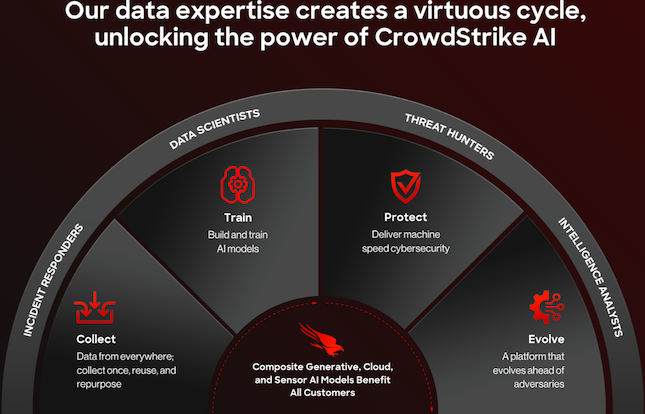Starliner, made it safely to the ground, albeit without its crew.

Whatever unkind thoughts I have towards Boeing these days, this is good news.
Starliner, made it safely to the ground, albeit without its crew.

Whatever unkind thoughts I have towards Boeing these days, this is good news.
I saw this on Twitter but it needs sharing. About men who think they are supportive of women, but only see women as appendages or extensions of themselves. No. They are someones, not someone’s someones. Why this is even an issue in 2024, I do not comprehend.

Back in gentler times, Parliament Hill here in Ottawa offered a unique attraction: a cat sanctuary.
Alas, the sanctuary is long gone. The cats were neutered and spayed many years ago, so their numbers were dwindling. And when the volunteer-supported sanctuary’s original caretaker passed away, the remaining cats were adopted and the sanctuary was abolished.
One of those cats was all-black Coal, adopted by a gentleman named Danny Taurozzi. Coal is 16 this year, still alive and kicking, the last remaining Parliament Hill cat. Coal is also a cancer survivor.
Cancer can kill cats quickly (as we sadly know all too well) so I am glad to learn that Coal is doing okay for now. I hope he has a few more years left, because when he closes his little eyes for the very last time, it will truly mark the end of an era.
Yesterday, August 9, 2024 marked the 79th anniversary of the last time nuclear weapons were used in anger. Or to put it another way, today began the 80th year without a nuclear war.
Can we make it through the end of this year, too, without major confrontation?
Russia vs. Ukraine. Iran vs. Israel. China vs. Taiwan. These are just the major flashpoints, but probably because they are on everyone’s front pages, they’re also the least likely ones. Fecal matter tends to encounter propellers in the most unexpected places. After all, who would have thought on June 28, 1914 that a student stepping out of a coffee house just as a car carrying a VIP made a wrong turn in the distant city of Sarajevo will change world history? Who would have thought on July 7, 1937 that a Japanese soldier with a belly ache in faraway Beijing would trigger an incident on a bridge informally named after a European explorer who visited centuries prior, leading to the first shots fired in a global calamity that eventually concluded with the aforementioned last use of a nuclear weapon in anger?

War. War never changes, goes the motto of the Fallout family of computer games. And I am increasingly worried that the Fallout games, just like a text game from the dawn of personal computing, A Mind Forever Voyaging, foreseeing a society with rising inequality, political polarization, authoritarian rule, will be treated not as cautionary tales but as instruction manuals…
It’s been nearly two years since the world has become feverish about GPT and its cousines, large language models that for many represented their first real interaction with machine intelligence.
Yet misconceptions abound. Expectations against these language models are often unrealistic, which then result in damning evaluations, still often characterizing the LLMs as mere “stochastic parrots”.
In reality, they are neither just random text generators, nor true intelligences with reasoning capability. They are language models.

I keep thinking that our future would be in safer hands if we let AI-assisted cats take over the reins.
What does that mean? They model, by learning through terabytes of examples, relationships between words and phrases, sections of text. Associations, in other words. They know that apples are red, not liquid; that the sky is blue, not serrated. Which is to say, they model language but language itself models reality.
The sheer size of these models, combined with the tremendous amount of material used to train them, leads to superhuman capabilities. The models are fluent in many languages. They understand intent. They can help uncover gaps in your knowledge, something that happened to me on numerous occasions. They can translate solutions into workable computer code. They know tricks of the trade that even experienced programmers may not be aware of. They can teach you, as indeed the models have taught me a thing or two about specific details of modern machine learning architectures. They can even offer some insight into their own capabilities and limitations.
Throughout it all, however, they rely primarily on their associative capabilities. They are not reasoning machines. Reasoning for these models is as hard as it is for you and me to multiply large numbers in our heads, without the benefit of pencil and paper or a calculator.
And ultimately, they are still just language models. Imagine if the speech center of your brain was somehow excised, made to operate on its own, without being able to rely on other parts of your brain hardware. No sensory inputs anymore. No ability to visualize things, to recall sounds, to imagine anything. No sense of continuity, no internal monologue, no “self”. Just a speech center that, when triggered, responds by generating words, but without the benefit of the instant reality check that would be offered by other parts of your brain acting in supervisory roles.
That’s what GPT and Claude really are.
So to expect them to excel at, say, solving nontrivial logic puzzles is like expecting a suspension bridge to work well as an airplane. Wrong tool for the wrong job.
I can certainly imagine LLMs (and preferably, continuously trained as opposed to pretrained LLMs) in the future, working as part of a larger network of specialized machine learning components, forming a complex “artificial brain”. But LLMs are not that, not yet. They are just one part of the puzzle, though arguably, they might very well represent the most important part.
It is, after all, through language that we learn the ability to not just react to the world around us but to comprehend it.
Having read comments from some Brits who wish to get rid of the monarchy in order to turn their country into a “democracy”, I despair. It is one thing that, in 2024, most folks are illiterate when it comes to science and technology but apparently, history and the social sciences are also badly neglected subjects.
My point, of course, is that these commenters confuse the form of government with the sources of power and the nature of the state.
A form of government may be a republic (res publica, i.e., governance in the name of the public) or a monarchy (monarkhia, rule of one), among other things.
However, both these forms of government can be autocratic (relying on the might of the state) vs. democratic (relying on the will of the people) insofar as the source of power is concerned.
And neither the form of government nor that source of power determine if the state will be liberal (that is, respecting basic rights and freedoms, such as freedom of conscience, freedom of enterprise, or the rule of law) or illiberal/authoritarian.

Midjourney’s response to the mostly Claude-written prompt, “Three regal anthropomorphic cats sitting on thrones, representing the orthogonal concepts of government. One cat wears a crown (monarchy vs republic), another holds a scepter and a ballot box (autocracy vs democracy), and the third balances scales of justice (liberal vs illiberal). The cats are arranged in a triangle formation against a backdrop of a stylized world map.”
To illustrate, let me offer a few examples. I live in Canada: a liberal, democratic constitutional monarchy. South of us is the United States: Also liberal and democratic, but a republic.
In contrast, the DPRK (North Korea) may serve as an example of a state that is an illiberal, undemocratic republic. Saudi Arabia is an illiberal, undemocratic monarchy.
Examples for other combinations are perhaps harder, but not impossible, to find. Orban’s Hungary, for instance, is rapidly converging on a state that is best described as illiberal, but democratic (the primary source of power is the people, not the might of the state) republic. I think some of the states in the Middle East (maybe Kuwait?) might qualify as relatively liberal, yet undemocratic monarchies.
These categories are not perfect of course, and do not cover all outliers, including theocracies, transitional governments or failed states. Still, I think it’s important to stress that the form of government, the source of power and the nature of the state are three fundamentally orthogonal concepts, and that all combinations are possible and do exist or have existed historically.
Understanding these distinctions is important. For instance, there are plenty of historical examples (e.g., the French Revolution devolving into the Reign of Terror, or the Russian revolution leading to the totalitarianism of the USSR) when the transition from monarchy to republic led to a significantly more autocratic regime. “Republic” is not a synonym for “democracy”.
It’s a civic holiday Monday that feels like a Saturday, reminding me of an old Soviet-era science-fiction novel, Monday begins on Saturday, by the Strugatsky brothers. It’s also a rather gloomy Monday morning, so it’s time for me to grumble about a few things.
For instance, how politics infuses everything these days. I signed up to follow a Facebook group dedicated to brutalist architecture, which for some inexplicable reason, I like. The comments section in one of the first posts I saw rapidly deteriorated into political bickering, as to whether or not it was appropriate to repurpose one of the Nazi-era indestructible flak towers in Hamburg as a luxury hotel. Because you know, politics is everything.

Speaking of which, I saw another post elsewhere about employees of a large US company who, after being told how successful the company was last year, were informed in the same breath that the company will cut their pension plan contributions. Needless to say, there followed comments about the evils of capitalism. Having experienced both capitalism and one of its alternatives, a socialist economy with central planning, all I can say is that capitalism works most of the time until it doesn’t; but when it doesn’t, victims are ever so eager to replace it with something that never works instead.
Then there was this post at an online news site claiming that it is practically impossible to run an ethical AI company. Well, what can I say? If you are telling me that allowing machine learning algorithms to learn from accumulated human knowledge is unethical, then sure, you are absolutely right. Then again, I suspect that what mainly drives such complaints is blatant ignorance of how machine learning works in the first place.
OK, well, never mind that, there’s good news. A fusion energy breakthrough: Neutron impact on tokamak components uncovered. Er… Say again? You are telling me that after 70+ years of research, we are beginning to understand why, or how, a heavy neutron flux rapidly destroys test equipment in the lab? Isn’t that like, say, greeting it as a “steam turbine breakthrough” when a prehistoric tribe manages to draw a spark from slamming together two rocks?
Oh well. On mornings like this, I feel I am beginning to comprehend the mood of the late, great Kurt Vonnegut who once told the CBC’s Anna Maria Tremonti to go jump in a lake.
The title of this blog post is used as the byline or catch phrase of the Canadian Centre for Experimental Radio Astronomy, a group operating a 12.8 meter radio telescope, a repurposed former NATO satellite communication facility, located in Carp, just outside of Ottawa.
One of the things they organize is a summer camp for students. Today, I was invited to talk to a small group of students, and indeed I did so, talking (mostly) about my work on the Pioneer Anomaly. It seemed like an appropriate topic, considering that detection and resolution of the anomaly was heavily dependent on radio science, specifically Doppler radio navigation.
It was fun, and my talk, I am told, was well received. I was also offered an opportunity to briefly tour the facility itself. It was fascinating, even though it was insanely hot inside the dome under the August sun. (I definitely needed a shower when I got back home.) The only memorable fly in the proverbial ointment is that I arrived late, thanks to a stupid disabled truck that blocked the Queensway, as a result of which it took forty minutes to get from Vanier Parkway to Parkdale. Fortunately, my hosts were understanding.
I mentioned this before: A Mind Forever Voyaging, a computer game from the 1980s, one of the text adventures of the legendary Infocom, a game in which you play an AI protagonist, sent to simulations of the future to explore the factors behind the decay and collapse of society.
As you venture further and further into the future, things get worse. Inequality, homelessness, violence.
I was again reminded of this game this morning when I saw the news: New mortgage rules are in effect, allowing borrowers less down payment and longer terms. As a result, the monthly mortgate payment for a $500,000 home is “only” around $2,700, give or take.
Has it occurred to anyone that perhaps the problem is not on the borrowing side but on the supply side? That if we lack affordable housing, making it easier for people to borrow money that they cannot afford to repay is not really a solution?
The same newscast again mentioned an increasingly frequent problem, “renoviction”, when people are evicted from their rent-controlled apartments because the landlord renovates, only to learn that they can no longer find a place of residence that they can afford.
Also on the news: yet another old business (opened 1954) is shutting down at the ByWard Market. In their case, it’s the changing nature of the business post-COVID but for many others, it’s the deteriorating public safety. Increased police presence only pushes the problem elsewhere, like Centretown. I had to drive across town today to our car dealership, for an oil change. I saw panhandlers at every major intersection. Not too long ago, such sights were rare, dare I say even nonexistent here in Ottawa. Now, downtown sidewalks are full of homeless folks.
I have said it before when I lamented about AMFV here in my blog: It’s a piece of (interactive) fiction. Please do not mistake it for an instruction manual. Let’s come back from the brink before it is too late. Unless it is too late already…
As a dual citizen of Canada and Hungary, I am of course delighted to hold an EU passport. Even though I have no plans to do so in the foreseeable future, it is nice to know that I have freedom of movement within the EU, and that in most places I could also claim permanent residence and work.
Unfortunately, as a person firmly committed to the values and interests of our Western alliance, I am increasingly concerned about Viktor Orban’s antics. His coziness with Russia’s dictator, his willingness to embrace undemocratic, “illiberal” policies for the sake of holding on to power, his warm relationship with Trump, his misuse of his position as Hungary holds the rotating EU presidency, exemplified by his rogue visits to Moscow and Beijing… Plain and simple, he is becoming a security threat to the Western alliance.
I have often called Orban in the past a horse trader (a particularly apt expression in the Hungarian language is “lókupec”). The implication, of course, was that even as Orban is deeply corrupt and unscrupulous, he is driven in the end by rational self-interest, and thus remains predictable and reliable.
But lately, I’ve been wondering if that is still true. What we are witnessing, I do not fully comprehend. Is he a Putin asset? Did he simply bet on the wrong horse this time around, now doubling down on a bad bet?
Whatever it is, he is not only doing tangible harm to his own country and, of course, the Western alliance, he is also making amateurish mistakes. The most recent example concerns his journey to Kyiv and Moscow. Parading around as a champion of peace, he forgot to talk to his hosts about the one thing that can severely impact Hungary’s economy: The uninterrupted supply of Russian oil through a pipeline that traverses Ukrainian territory. Oops!
Orban is now widely despised in the West and with good reason. At home, however, he remains firmly in charge. The secret, beyond his “illiberal” concentration of powers and his success at undermining independent media and the independence of the judiciary, is the flawed historical self-assessment of his nation. Many Hungarians still view themselves as victims of the Paris peace treaty of 1919, which they see as massively unfair, robbing the country of roughly two thirds of its historical territory. Which undeniably happened, of course, but context is everything. The last time those historical borders of Hungary existed as the borders of an independent political entity was in 1526, when Hungary suffered a devastating loss fighting the Ottoman Empire (a self-inflicted wound, arguably, as it was Hungary that broke a peace treaty with the Ottomans.) Fast forward to the 20th century: we have a map created by a famous Hungarian cartographer, Károly Kogutowitz who, using data from the last pre-war census of 1910, compiled this ethnographic map of the country:
Although there are clearly visible areas of the map outside the country’s present-day borders that had majority Hungarian populations, the borders are roughly in the right place. We can argue about specific patches of land in the border regions of Slovakia, in northern Transylvania, and a few other locations (hey, my father’s family is from Temesvár, now Timisoara, Romania, and I’ve had friends and relatives from famous, formerly Hungarian towns like Kolozsvár/Cluj or Marosvásárhely/Tirgu Mures, so it’s not like I am unaware of their plight, especially under Ceausescu’s regime), but one thing is clear: most of the territory of the historical Kingdom of Hungary was not dominated by a Hungarian ethnic majority. Should not be surprising: medieval kingdoms were not ethnic nation-states. Whether or not it is wise to base borders on ethnicity is another question, but so long as we accept that premise, the borders speak for themselves: they may not be fair but they certainly represent ethnic realities far more closely than the historical borders many Hungarians still dream about.
Orban of course can whip up nationalist feelings. He can easily explain his stance on Ukraine to his domestic audience by alluding to how badly ethnic Hungarians are supposedly treated in that country. The Orban of the past: the young leader of a youthful movement (Fidesz stands for Alliance of Young Democrats in Hungarian) is long forgotten. Instead, we now have a leader that adores Russia’s dictator. A leader whose actions appear to echo a past when, nearly a century ago, another Hungarian leader, Horthy, maneuvered the country into a foreign policy cul-de-sac. I fear that something similar is going to happen again, and the country will suffer, just as it suffered during that fateful winter of 1944-45 when it was ravaged by war and by brutal Nazi rule, only to be followed by more than four decades of communist oppression.
I heard a rumor: Russia was significantly less affected by the CrowdStrike cyberoutage. Could it be that they were behind it?
Of course not. Never attribute to evil that which you can explain by stupidity. But in this case, backwardness was also on Russia’s side. You might have seen memes about Southwest Airlines, largely unaffected on account of the fact that many of their systems still run on Windows 3.1. Well, it Russia it’s… like that, even more so. As an example, here’s a CrowdStrike-affected display panel from a few days ago at JFK airport in New York City:

In contrast, here’s a departures board from a small Russian airport:

Kind of hard to hack, that one.
Apparently, The Simpsons predicted not just the Trump presidency but also the attire and demeanor Kamala Harris.

OK, so the color is a little bit off. But just like Lisa Simpson, Kamala Harris, if elected, will have to deal with some of Trump’s legacy.
So everyone is talking about the major IT outage today (which actually turned out to be two unrelated outages, the second due to a since-remedied issue with Microsoft Azure platform), namely the fact that millions of physical computers and virtual machines around the world are crashing due to a driver failure in what is known as CrowdStrike Falcon.
I admit I have not heard of CrowdStrike Falcon before. I had to look it up. So I went to the most authoritative source: the company’s Web site.

“Cybersecurity’s AI-native platform for the XDR era,” it tells me, and “We stop breaches”. XDR is supposedly “extended detection and response”. Wikipedia tells me that “the system works by collecting and correlating data across various network points such as servers, email, cloud workloads, and endpoints”. Microsoft tells me that XDR “is a holistic security solution that utilizes automation and AI to reduce response time across multiple workloads”.
Going back to CrowdStrike, I learn that it yields $6 of return for every $1 invested. (How?) That it identifies 96% more potential threats. (More than what? More dentists use…) It tells me that it is leads to 2x as effective security teams with 66% faster investigations… compared to what?
Okay, scrolling down… it’s “cloud-native”, “single-platform” and an “open and extensible ecosystem”. It is “data-centric” and “AI-native” with “workflow automation”.
So far there is one thing I have not yet learned: What the bleepety-bleep does it do?
Of course I can guess. I know what security solutions are supposed to do, and I have no doubt that CrowdStrike delivers… more or less, probably not any better than its major competitors. But they certainly have good marketing, with all the right buzzwords!
Unfortunately, behind these buzzwords there is a flawed mentality. The implication that all it takes is a fancy software solution to protect your enterprise. Never mind that a good chunk of the threats (I was going to say, “vast majority”, but I have no data to back that up) are not in the form of malware. If I communicate with a senior manager at a bank and convince them to initiate an important transfer that later turns out to be fraudulent, no cybersecurity is going to prevent that.
And as today’s example shows, protection from malware and other technological threats is just one element of a successful cybersecurity policy. A comprehensive policy must be based not just on prevention but also the recognition that sometimes, despite your best efforts, excrement can hit the ventilator. How do you detect it? What do you do?
That leaves us to these main points that must be on everyone’s cybersecurity checklist, whether you are a small company or a major international enterprise. Here, in no particular order, and I am sure I left some things out:
I mean, come on, CrowdStrike’s graphic is eye-catching but I swear I drew much more informative diagrams well over a decade ago when educating customers about the need for comprehensive security. Like these, for instance.

Sure, comprehensive cybersecurity technology can help with some of these points. But not all. For instance, no cybersecurity solution will help you if broad dependence on a third-party component in your enterprise suddenly causes a widespread outage. That dependence can be anywhere, could be a simple messaging app or a complex cybersecurity suite. If it causes systems to crash, and you have no proven, tested policies and practices to detect, mitigate, and recover from an event like that, you’re in deep doo-doo.
Oh wait. That’s exactly what happened to far too many companies today.
I admit I almost lost it last night.
I was attempting to sign up as an author with a notable scientific journal (who shall remain nameless as I am cowardly and I hope to remain in their good graces.) I was confronted with a questionnaire asking about some personal details.
Okay, so they want to know about my name, e-mail address, office phone and institution. All perfectly reasonable, even though I do not have a formal affiliation which sometimes means going through extra hoops, trying to convince the software that I am nonetheless legit. Then came more personal questions such as my gender and age. But then… race, ethnicity, sexual orientation…
Sexual orientation???

I beg your pardon?
Say what? I apologize for language that’s rude and crude, but what the fuck do my scientific contributions have to do with the privacy of my bedroom and how is that your fucking business?
I generally consider my ideological affiliation left-of-center, which is to say more likely leaning towards a progressive liberal attitude. But this? Granted, there was the option, “prefer not to answer”. Nonetheless, I was beyond offended. In this context, the question is downright creepy. What are they going to ask next from prospective authors? How often do you masturbate? Do you prefer conventional or unconventional positions while copulating? Are you into S&M?
I mean, seriously, all I am trying to do is to submit a physics paper to a scientific publication. Not interrogated about my bedroom habits.
Of course I know the answer. This is checkbox-driven DEI virtue-signaling. Someone, somewhere, will write a report about how well (or how badly) this scientific publication represents various communities. Never mind that the actual science should have absolutely nothing to do with race, ethnicity, or sexual orientation. They now have checkboxes, and no doubt, folks patting themselves on the back being proud of what they have accomplished, making the world more inclusive and all.
Except that they didn’t. Except that these forms of aggressive, self-serving episodes of virtue signaling achieve the exact opposite: instead of steering the world towards a future in which such superficial characteristics no longer matter, instead of a world in which we are all judged by the content of our character, they not only keep divisions alive, they are actively deepening them.
And that’s why we can’t have nice things anymore.
This is a picture perfect moment. For all the wrong reasons, but this image is destined for the history books.

July 13, 2024. I have the feeling that it will be remembered like a day almost precisely 80 years ago, July 20, 1944, when another defiant leader emerged, mostly unscathed, from an assassination attempt.
Assassinations do not restore or strengthen democracy. We’ve known that at least since the times of ancient Rome, since Marcus Junius Brutus and co-conspirators assassinated Julius Caesar almost two thousand years ago. Rather than saving the Roman Republic, they hastened its demise.
The only thing worse than the assassination of a tyrant (or a would-be tyrant, as some see Trump) is a failed assassination. Which is what happened 80 years ago in the famed Wolf’s Lair. Ironically, Hitler was also injured in his ears. But far from weakening him, the assassination attempt likely played a role in Germany fighting all the way to the bitter end, as Hitler viewed his survival as a divine moment. What the fallout from the attempt on Trump’s life will be is yet an open question, but there is one thing of which I am sure: it’s going to be bad news for his political opponents and, by extension, for all of us who worry about the future of the Western democratic world order.
Throughout her life my Mom earned a living as a artisan textile dyer in Hungary. Nothing fancy, her usual work involved bringing home to her workshop a few hundred, e.g., silk sheets, hand-dying them with predetermined, preapproved patterns (mostly fashionable headscarves, which were very popular in Europe in the 1960s, 1970s), then returning them to the warehouse, which then sent them out for further processing (steam fixing, hemming, etc.)
One day in 1984 she was asked to do something different: To prepare several silk sheets, using the designs, and under the supervision, of a well-known artist (Judit Szabó), for public display in a community hall in a small Hungarian town (Földeák).
She was reminded of this during our recent conversation. Though I had no high expectations, I searched for it using the name of the town and the artist. To our no small astonishment (and to my Mom’s great delight), I found it. The silk sheets are still there (or at least, they were back in 2021), adorning the walls of the town’s wedding hall. Not only that, someone actually took the trouble to take some decent photographs of it and publish it on a nice Hungarian-language Web site.
I was so busy with things like Linux updates, I forgot to celebrate. My main Internet domain, vttoth.com, was 30 years old just ten days ago.
$ whois vttoth.com | grep "^Creation Date" Creation Date: 1994-06-30T23:00:00Z
To be sure, it’s not the oldest domain in existence, not by a longshot.
$ whois oracle.com | grep "^Creation Date" Creation Date: 1988-12-02T05:00:00+0000
But then, look at these guys:
$ whois facebook.com | grep "^Creation Date" Creation Date: 1997-03-29T05:00:00Z $ whois google.com | grep "^Creation Date" Creation Date: 1997-09-15T07:00:00+0000 $ whois whitehouse.gov | grep "Creation Date" Creation Date: 1997-10-02T01:29:32Z
So yes, I suppose I’ve been around. Here’s the earliest version of my Web site as remembered by The Wayback Machine:

Well, I suppose Web sites have become a tad more sophisticated since then.
I thought I remembered once seeing a YouTube video that showed, using excellent graphics, how violence actually declined over the centuries.
And indeed I did: but the video focused primarily on the death toll of World War II. Even so, in the final one third of the presentation, Neil Halloran, the video’s creator, does explore how, when adjusted for the size of the population, wars actually became less devastating over time.
This is also the view if Steven Pinker, who often discussed the “decline in violence” in his work and his talks.
Others, however, are less sure. And indeed, when I explore it myself using raw data from ourworldindata.org [chart 48], courtesy of Max Roser, the picture is decidedly less rosy.

Looking at this logscale plot showing death rates per 100,000 in conflicts since he middle ages actually shows an increase. And while indeed, the past 80 years can be described as the “long peace”, it’s more an anomaly than a trend.
In fact, looking at this chart I can comprehend the optimism of those who greeted the previous turn of the century, 1900 that is, as the start of the “century of reason”. If only…
This morning, I was confronted with examples of both racism and virtue signaling in unexpected ways.
The morning local news told me that Middle Eastern drivers are 2.9 times more likely to be stopped by police, even though it is white drivers who are the most likely to be charged. Unsaid but implied, cops are supposedly racists.
But if you know how people drive in some Middle Eastern locales, perhaps there is a different explanation. Especially considering that when you are driving a police cruiser, chances are you have absolutely no idea who the driver is until they stop, you walk over, and they roll down the driver side window. Imagine you are a cop, stopping someone because he drives like they do in places like Cairo or Baghdad. You walk over, they roll down the window. “Oh damn, another Middle Eastern driver on my record,” you think, and you let them go with a verbal warning, lest you end up being accused of racism.
So which is more likely? That cops have magic eyes and can tell the ethnicity of a driver even from a sillhoutte as their cruiser follows another vehicle, or that perhaps, just perhaps, Middle Eastern drivers who grew up in a very different driving culture have some trouble, at least initially, to adjust their driving habits, so they do in fact end up being stopped more often but that cops also tend to be more lenient in their case?
Or perhaps none of the above. My speculation is not any better than anyone else’s: It’s still speculation. What matters are the data. Just make sure that the sampling and statistical analysis are free of hidden biases.

It is surprisingly hard to convince image generation AI to produce images on this topic without running into dumb (keyword-based) blocks against “harmful” content. This one is from Midjourney.
I was still pondering this when I received an e-mail. Someone asked if, as a scientist, I believe in things like genetic differences between races or policies that take such differences into account. After some thought, I responded with a question myself. I asked if they meant the genetic differences between blondes and brunettes. Or maybe the genetic differences between people with big vs. small noses. After all, we “know” that blondes are supposed to be dumb and people with big, hooked noses are consumed with greed and are disloyal…
This consumed far too much of my time.
I had to update my server systems, both “on-premises” (meaning my home office) and “in the cloud” (my small cloud VM hosted by Amazon). They’ve been running CentOS 7 since 2016, and CentOS 7 reached its end-of-life. Back then, I of course anticipated that by this time, I’d have long ago upgraded my systems to CentOS 8. But that was before Red Hat decided to play hardball with all of us, turning CentOS from a robust open version of Red Hat Enterprise Linux into a bleeding edge, more or less experimental/test version.
So I had to switch. And it wasn’t easy.

I eventually opted for Oracle Linux (itself an RHEL derivative), after seriously considering both AlmaLinux and Rocky Linux. It seemed like the best compromise. I wanted an RHEL-compatible distribution to minimize the pain of the upgrade, and I wanted to pick the distribution that was the most likely to have robust long term support. Considering how Red Hat continues to play hardball with others, Oracle seemed the safest choice: They have the requisite in-house resources to “go it alone” if needed, and their cloud infrastructure alone appears to guarantee a long-term commitment. We shall see if I chose wisely.
And yes, it’s OL8 for now, though this time around, I plan an upgrade long before this product line reaches EOL. But first, stability.
I think everything works on my servers, and things are settling down nicely. But some other machines that I am responsible for still need some gentle care and feeding. It was an educational experience. I dare not share my detailed notes here as they contain information that probably should not be publicly disclosed about details of my configuration, but I have dozens of pages of notes detailing the quirks that I encountered.
All is well that ends well. But why do I have the feeling that this forced upgrade represents many days of my life that were lost for no good reason, days that I’ll never get back? Oh well.